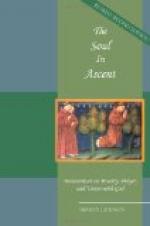The prophecy of the soul is not less evident in the emotional nature. At first the soul is either so imperfect, or so limited by the body, that it seems to be nothing but a creature of emotions. It loves, but its affections are selfish and egotistic. What may be called the epochs in its growth are finely treated by Coleridge in “The Ancient Mariner” and by Tennyson in “In Memoriam.” The Ancient Mariner felt only selfish affection. He had no love for “being as being.” He killed the albatross with as little heed as he disregarded his fellow-men; but the ministries of his misery were multiplied until, at length, he was able to see something beautiful even in the writhing green sea-serpents that followed the ship of death on which he sailed. That was the first sign of the larger interest which had long been growing within him, and which was to continue to grow until he could say,
“He prayeth best who
loveth best
All things both great and
small.”
“In Memoriam” is the record of the expansion of a soul through its increase in love. At the beginning of his grief the poet sings, dolefully and hopelessly, through his tears,
“He is not here; but
far away
The noise
of life begins again,
And ghastly
thro’ the drizzling rain
On the bald street breaks
the blank day.”
But the soul is growing secretly and surely as wheat grows in winter. The Christmas bells ring out their music and at first are almost hated, but they break through the shell of sorrow and let in a faint echo of the world’s great suffering and the world’s great joy. Thus human sympathy is enlarged just a bit. In successive years the music of the Christmas bells is heard more distinctly, the sorrow of the world becomes more audible, sympathy reaches farther. At last the poem which began with a miserere ends with a marriage, and he who could at first write that dreary line,
“On the bald street breaks the blank day”
testifies to the beneficence of the path in which he had been led in this wise and beautiful stanza,
“Regret is dead, but
love is more
Than in
the summers that have flown,
For I myself
with these have grown
To something greater than
before.”
From dwelling in a prison with grief as a jailer he has caught a vision of the,
“One far off divine
event
To which the whole creation
moves.”
This expansion of the soul is not difficult to follow. Traces of it may be seen in the enlarged sympathy, the growing brotherhood, and in the rapidly increasing conviction that even nationalities are only temporary expedients for bringing the day when love shall be the universal law. The charities and philanthropies which are blossoming in every city and country district, the consciousness of responsibility for the poor and weak, the angel songs which are heard in the midst of battle, and the gradual disappearance of war, are all vague but true prophecies of what the soul will be when love is perfected. The knowledge of past progress is an inspiration, and the imagination of what will be a glorious hope.




